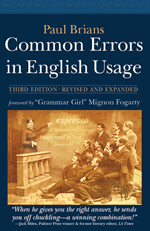alumnus / alumni
yanira.vargasWe used to have “alumnus” (male singular), “alumni” (male plural), “alumna” (female singular) and “alumnae” (female plural); but the latter two are now popular only among older female graduates, with the first two terms becoming unisex. However, it is still important to distinguish between one alumnus and a stadium full of alumni. Never say, “I am an alumni” if you don’t want to cast discredit on your school. Many avoid the whole problem by resorting to the informal abbreviation “alum.”
BUY THE BOOK!
